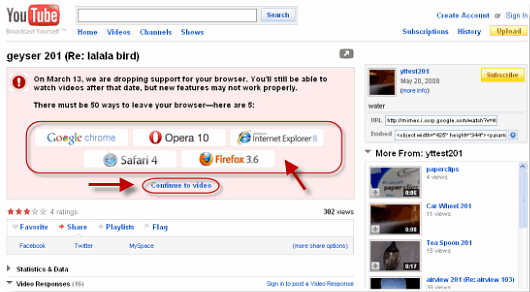
Over six months ago, Google announced it would start phasing out support for Internet Explorer 6 on Orkut and YouTube, and started pushing its users to modern browsers. The search giant has now given a specific kill date for old browser support on the video website via a page on Google.com titled Solve a Problem: Upgrading your browser:
Support stops on March 13th. Stopped support essentially means that some future features on YouTube will be rolled out that won't work in older browsers.
As you can see in the screenshot above, YouTube will have an interstitial appear when users on older browser try to watch a video on YouTube. Google says the interstitial will show up indefinitely every two weeks until the user upgrades to the most recent version of their browser. Google deems anything below IE7, Firefox 3.0, Chrome 4.0, and Safari 3.0 as an "older browser." Users on these browsers will still be able to watch YouTube videos, but additional features that Google plans to roll out may not be supported in these older browsers.
Late last month, Google announced it will end old browser support for Google Docs and Google Sites on March 1, 2010 and earlier this month, the company announced it would start to phase out support for these browsers for Google Mail and Google Calendar by year end. Google is pushing both enterprise and consumer users towards newer browsers on all its Web properties.
Google's stance on IE6 varies from Microsoft's because the search giant does not need to support Windows XP, the operating system with which IE6 first shipped, as long as Redmond (which will support XP and IE6 until April 8, 2014). Microsoft, on the other hand, which has stated time and time again that it wants to see IE6 disappear as much as anyone else, refuses to force anyone to upgrade (though it's worth noting that the software giant's Office Web Apps won't support IE6 either, just like Google Docs) and says the decision is ultimately up to the user.
Microsoft is trying to push users to upgrade by touting IE8's many features over IE6, particularly in the area of security. So far, this has worked relatively well, as IE8 is the most popular browser, although IE6 is still used by about 20 percent of surfers worldwide, according to NetApplications.
reader comments
61